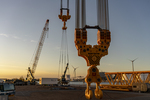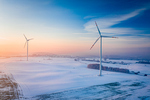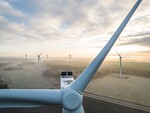06/17/2010
USA - Airborne wind turbines lift off
Alt energy enthusiasts have talked about harnessing powerful winds from the troposphere since the 1970s, but technological limits made it seem like a distant dream. Well, it's 2010, and the future has arrived. Airborne wind turbine prototypes are finally taking flight.
At high altitudes, global winds have an estimated potential of 800 terawatts. With an eye on that prize, Santa Cruz, California-based company Joby Energy has been busy testing prototypes of its turbines. The current prototype is a 30-kilowatt system that looks like a high-tech version of the Wright Brothers' plane, sans cockpit. An array of turbines lift the structure into the air vertically and then it moves in a giant circular motion to maximize exposure to cross-winds. Electricity is then transmitted through the tether.
"The redundancy of motors and turbines ensures that the system can be controlled in the unlikely event of on-board motor failure," says Joby Energy spokesperson Sher Quaday. "We use rigid wing structures as opposed to fabric structures, which enables us to operate for several years without replacing components." In addition, Joby Energy says its system is reliable and efficient because it generates power on-board, transmitting energy electrically as opposed to mechanically. If the current prototype can prove itself, Joby will try out a 100-kilowatt version next year. The company estimates that its first system deployment is likely about two years away.
Several other companies are developing airborne wind turbines, too, including Makani Power, Sky WindPower and Magenn Power. Collectively these companies face key challenges, though. For one, the Federal Aviation Administration currently limits the flying height of the turbines to 2,000 feet, and the FAA isn't known for making changes quickly. Wind turbines also continue to face resistance on the ground, so any approved high-flying version will have to pass a battery of safety tests first. Beyond human safety, there are other concerns.
"We've been meeting with avian researchers and are concerned about the birds and bats," Quaday says. The company plans to work closely with organizations to prevent the technology from harming wildlife or the environment.
To help get high altitude wind stakeholders on the same page, the Airborne Wind Energy Consortium was formed this year. In September the consortium and NASA will hold a conference to highlight the latest research, including materials, technology and regulatory issues. With the devastating oil spill continuing to bleed into the Gulf of Mexico, affordable alternative energy never felt more pressing. There are signs that on the political front, wind power is gaining stronger support. Last month the Senate Energy Committee amended the American Clean Energy Leadership Act to consider high-altitude wind power systems for energy research and development.
Inevitably some people are going to say that high-flying wind turbines are a crazy idea, that they're dangerous, problematic and pursuing them is foolhardy. Funny, those sound like the same arguments that were historically used against human flight. With enough cooperation, research and development, I have a feeling that the day will come when we can glimpse airborne wind turbines from plane windows.
For more information please contact Trevor Sievert at ts@windfair.net
At high altitudes, global winds have an estimated potential of 800 terawatts. With an eye on that prize, Santa Cruz, California-based company Joby Energy has been busy testing prototypes of its turbines. The current prototype is a 30-kilowatt system that looks like a high-tech version of the Wright Brothers' plane, sans cockpit. An array of turbines lift the structure into the air vertically and then it moves in a giant circular motion to maximize exposure to cross-winds. Electricity is then transmitted through the tether.
"The redundancy of motors and turbines ensures that the system can be controlled in the unlikely event of on-board motor failure," says Joby Energy spokesperson Sher Quaday. "We use rigid wing structures as opposed to fabric structures, which enables us to operate for several years without replacing components." In addition, Joby Energy says its system is reliable and efficient because it generates power on-board, transmitting energy electrically as opposed to mechanically. If the current prototype can prove itself, Joby will try out a 100-kilowatt version next year. The company estimates that its first system deployment is likely about two years away.
Several other companies are developing airborne wind turbines, too, including Makani Power, Sky WindPower and Magenn Power. Collectively these companies face key challenges, though. For one, the Federal Aviation Administration currently limits the flying height of the turbines to 2,000 feet, and the FAA isn't known for making changes quickly. Wind turbines also continue to face resistance on the ground, so any approved high-flying version will have to pass a battery of safety tests first. Beyond human safety, there are other concerns.
"We've been meeting with avian researchers and are concerned about the birds and bats," Quaday says. The company plans to work closely with organizations to prevent the technology from harming wildlife or the environment.
To help get high altitude wind stakeholders on the same page, the Airborne Wind Energy Consortium was formed this year. In September the consortium and NASA will hold a conference to highlight the latest research, including materials, technology and regulatory issues. With the devastating oil spill continuing to bleed into the Gulf of Mexico, affordable alternative energy never felt more pressing. There are signs that on the political front, wind power is gaining stronger support. Last month the Senate Energy Committee amended the American Clean Energy Leadership Act to consider high-altitude wind power systems for energy research and development.
Inevitably some people are going to say that high-flying wind turbines are a crazy idea, that they're dangerous, problematic and pursuing them is foolhardy. Funny, those sound like the same arguments that were historically used against human flight. With enough cooperation, research and development, I have a feeling that the day will come when we can glimpse airborne wind turbines from plane windows.
For more information please contact Trevor Sievert at ts@windfair.net
- Source:
- Online Editorial, www.windfair.net
- Author:
- Posted by Trevor Sievert, Online Editorial Journalist
- Email:
- ts@windfair.net
- Link:
- www.windfair.net/...
- Keywords:
- Wind energy, wind power, wind turbine, wind mill, offshore, onshore, wind farm, renewable energy


























